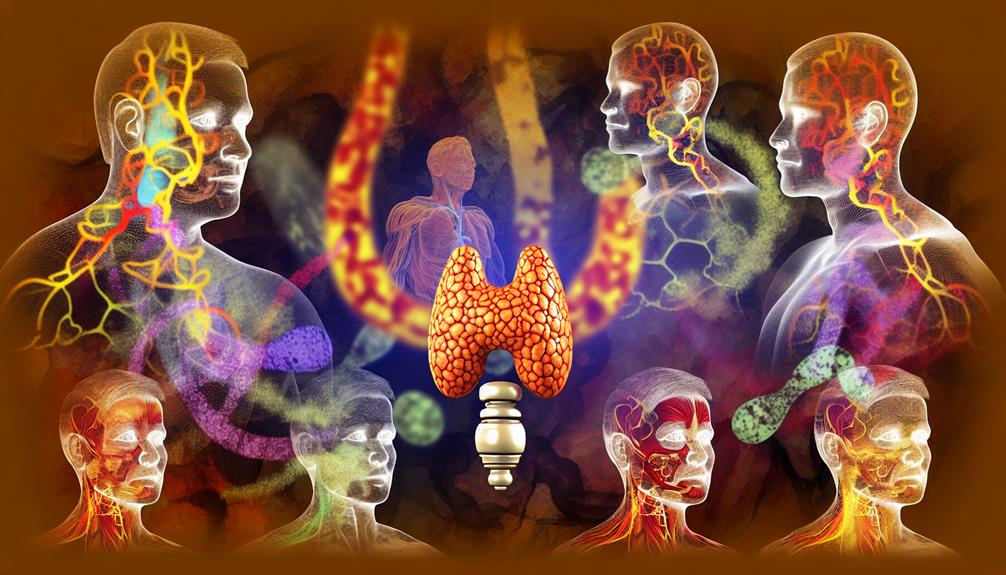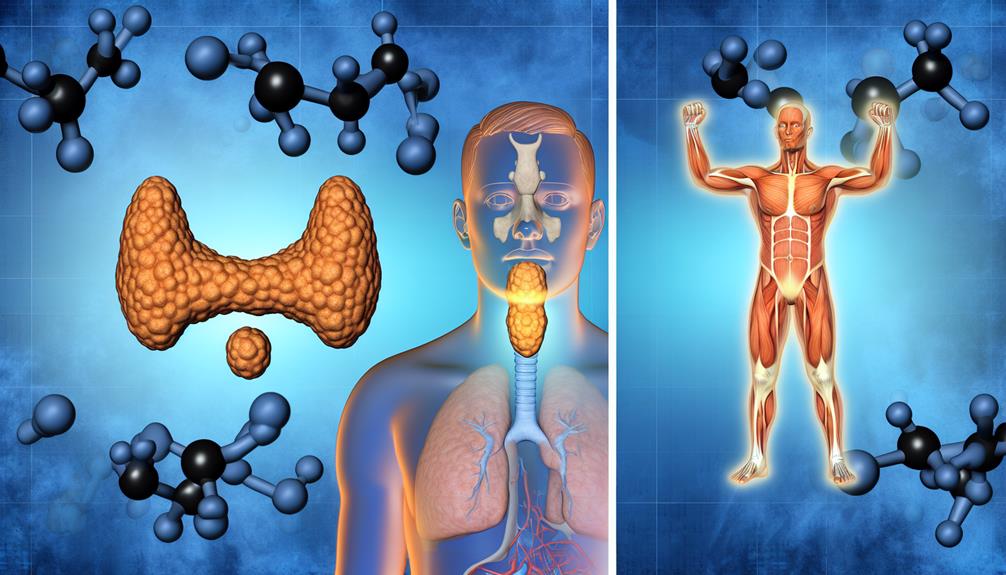Thyroid function considerably impacts men's hormonal health, particularly in regulating testosterone levels and metabolic balance. Iodine is essential for synthesizing thyroid hormones T4 and T3, which are critical for the hormonal interplay. When thyroid hormones are imbalanced, it can lead to decreased testosterone production, affecting libido and sperm quality. Symptoms of thyroid dysfunction include fatigue, weight fluctuations, and mood changes. Diagnosing this requires testing TSH, free T4, and free T3 levels. Understanding these connections is important for hormonal health, and there's much more to explore about optimizing balance and managing any issues effectively.
Understanding Thyroid Function

In recent years, I've come to appreciate the critical role the thyroid plays in regulating various bodily functions. The thyroid, a butterfly-shaped gland located at the base of the neck, is intricately designed to facilitate hormone synthesis, primarily thyroxine (T4) and triiodothyronine (T3). Understanding thyroid anatomy is fundamental to grasp how this gland influences metabolic processes and overall health.
The thyroid consists of two lobes connected by an isthmus, encapsulated by a fibrous capsule. Within its structure, follicular cells synthesize and secrete T4 and T3, essential hormones that dictate metabolic rate, energy production, and temperature regulation. Parafollicular cells, or C cells, produce calcitonin, which plays a role in calcium homeostasis. This functional division highlights the thyroid's diverse contributions to hormonal balance.
When examining hormone synthesis, it's important to recognize the role of iodine, an essential dietary component. Iodine is incorporated into the amino acid tyrosine to produce T4 and T3. The hypothalamus and pituitary gland tightly regulate this synthesis through feedback mechanisms, ensuring the body maintains homeostasis. Any disruptions in thyroid function, whether from autoimmune disorders, iodine deficiency, or other factors, can lead to significant hormonal imbalances.
The Thyroid-Hormone Connection
A significant connection exists between thyroid function and hormonal health, particularly in men. The thyroid gland plays a vital role in hormone regulation, influencing various physiological processes. When I examine thyroid disorders, I often see how they can disrupt this delicate balance, leading to a cascade of hormonal imbalances that affect overall health.
Thyroid hormones, primarily thyroxine (T4) and triiodothyronine (T3), are essential for metabolism, energy production, and even reproductive health. These hormones act on nearly every cell in the body, modulating the activity of other hormones, including insulin and cortisol. When thyroid function is compromised, whether due to hypothyroidism or hyperthyroidism, the subsequent hormonal dysregulation can lead to significant health issues.
For instance, in cases of hypothyroidism, the reduced levels of T3 and T4 can lead to increased levels of thyroid-stimulating hormone (TSH), which may trigger a compensatory increase in other hormones. This imbalance can manifest as fatigue, weight gain, and mood disturbances, ultimately impacting a man's quality of life. Conversely, hyperthyroidism can accelerate metabolic processes, leading to heightened levels of cortisol and other stress-related hormones, which can contribute to anxiety and weight loss.
Impact on Testosterone Levels

I want to explore how thyroid function directly influences testosterone production, as an imbalance can lead to significant hormonal disruptions. Understanding these consequences is essential for identifying effective treatment and management options. By analyzing the interplay between these hormones, we can gain insights into optimizing men's hormonal health.
Thyroid and Testosterone Production
Thyroid hormones play an essential role in regulating testosterone production, and understanding this relationship is important for men's hormonal health. Thyroid dysfunction can considerably impact testosterone regulation by disrupting the delicate hormonal feedback within the endocrine system. For instance, low levels of thyroid hormones can lead to decreased testosterone synthesis, which may affect libido and contribute to infertility issues.
The thyroid sperm relationship is particularly remarkable, as thyroid hormones help maintain ideal metabolic rates essential for spermatogenesis. When thyroid hormone levels are imbalanced, it can lead to reduced sperm quality and quantity, further exacerbating fertility challenges. Additionally, the interplay between thyroid hormones and testosterone suggests that men with hypothyroidism may experience symptoms like fatigue, decreased libido, and overall hormonal imbalance.
In cases where thyroid dysfunction is diagnosed, hormone replacement therapy may be necessary to restore balance. By addressing thyroid health, one can positively influence testosterone levels, thereby enhancing overall well-being. Understanding these connections is vital for men seeking to maintain their hormonal health, and it highlights the importance of monitoring both thyroid and testosterone levels in clinical practice.
Hormonal Imbalance Consequences
Hormonal imbalances can considerably disrupt testosterone levels, leading to a cascade of physiological and psychological consequences. I've observed that these hormonal disruptions can greatly impact various aspects of health, particularly in men. When testosterone levels drop, the metabolic effects can be profound, resulting in weight gain and diminished energy levels.
| Consequence | Description | Impact on Health |
|---|---|---|
| Fertility Issues | Decreased sperm production and quality | Impaired reproductive health |
| Mood Swings | Increased irritability and anxiety | Altered emotional stability |
| Libido Changes | Reduced sexual desire | Relationship challenges |
| Sleep Disturbances | Insomnia or disrupted sleep patterns | Impaired cognitive function |
Furthermore, the interplay between testosterone and cardiovascular health can't be ignored. Lower levels may contribute to increased risks of heart disease. I've found that many men experience mood swings and cognitive decline as a result of these hormonal changes. It's critical to recognize these signs early on, as they can lead to a decline in overall well-being, affecting both personal and professional aspects of life.
Treatment and Management Options
Several effective treatment and management options exist to address low testosterone levels, particularly when they stem from underlying thyroid dysfunction. I've found that the first step often involves identifying and treating the thyroid disorder itself. Once thyroid hormone levels are optimized, testosterone levels may improve as a natural consequence.
In terms of medication options, testosterone replacement therapy (TRT) can be considered. This therapy can restore testosterone levels directly; however, it's essential to monitor thyroid function closely during this treatment. Additionally, other medications that improve thyroid function, such as levothyroxine or liothyronine, can also play a significant role in addressing hormonal balance.
Lifestyle changes are equally important. Regular exercise, particularly strength training, can boost testosterone levels. Furthermore, a balanced diet rich in healthy fats, vitamins, and minerals supports both thyroid and hormonal health. Managing stress through mindfulness or yoga can also help maintain hormonal balance.
Symptoms of Thyroid Imbalance
When the thyroid isn't functioning properly, a range of symptoms can manifest that considerably impact overall health. I've observed that one of the most common fatigue indicators is a constant sense of tiredness, regardless of how much sleep I get. This can lead to significant energy level fluctuations, making daily tasks feel challenging. Additionally, I've noticed that weight fluctuations often accompany thyroid issues; whether it's unexpected weight gain or loss, it can be perplexing and frustrating.
Mood changes can also be striking. One moment, I might feel irritable or anxious, and the next, I could be battling depressive thoughts. Libido issues are another red flag; a noticeable decrease in sexual desire can indicate an underlying thyroid imbalance. Moreover, cognitive decline can manifest through forgetfulness or difficulty concentrating, severely affecting productivity.
Sleep disturbances often plague individuals with thyroid problems. I've found that my sleep patterns can be erratic, which compounds the fatigue I already feel. Skin changes, such as dryness or increased oiliness, can also signal thyroid dysfunction. Hair thinning is another symptom I've encountered, leading to decreased confidence and self-image. Finally, temperature sensitivity—feeling excessively cold or hot—can be quite disconcerting and may serve as a warning sign of an underlying thyroid condition. Recognizing these symptoms is essential for addressing potential thyroid issues and maintaining overall hormonal health.
Diagnosis and Testing Methods

Diagnosing thyroid issues involves a systematic approach utilizing various testing methods to assess thyroid function accurately. As someone who's navigated this complex landscape, I understand how essential it is to pinpoint thyroid disorders effectively. The right testing procedures can provide insights that lead to appropriate treatment and, ultimately, improved hormonal health.
Here's a breakdown of the important testing methods I find most effective:
- TSH (Thyroid-Stimulating Hormone) Test: This blood test measures the level of TSH, which regulates thyroid hormone production. Elevated levels often indicate hypothyroidism, while low levels can suggest hyperthyroidism.
- Free T4 and Free T3 Tests: These tests measure the levels of the active thyroid hormones in the blood. They help determine how well the thyroid is functioning and can differentiate between various thyroid disorders.
- Thyroid Antibodies Test: This test checks for the presence of antibodies that may indicate autoimmune thyroid disorders, such as Hashimoto's thyroiditis or Graves' disease. Understanding whether the immune system is attacking the thyroid is crucial for accurate diagnosis.
Strategies for Hormonal Balance
To achieve ideal hormonal balance, I often emphasize the importance of nutritional support and regular exercise, particularly in relation to thyroid health. A well-rounded diet can provide essential nutrients that support hormone production and regulation. Additionally, incorporating physical activity can enhance metabolic function and improve overall endocrine health.
Nutritional Support for Hormones
Nutritional support plays an important role in maintaining hormonal balance, particularly in men who may experience fluctuations in hormone levels due to various factors. To optimize hormonal health, I've found that focusing on a few key strategies can make a substantial difference.
- Prioritize Healthy Fats: Incorporate sources like avocados, nuts, and olive oil, which support hormone production and nutrient absorption.
- Diverse Protein Sources: Choose a variety of proteins, including lean meats, fish, and legumes, to guarantee you're meeting your amino acid needs, which are crucial for hormone synthesis.
- Micronutrient Balance: Pay attention to vitamins and minerals, particularly zinc, magnesium, and vitamin D, as these micronutrients are essential for maintaining hormonal equilibrium.
Additionally, considering meal timing can enhance nutrient absorption and support overall metabolic function. Integrating anti-inflammatory foods and certain herbal remedies can further contribute to hormonal health. By adopting these nutritional strategies, I believe it's possible to foster a more balanced hormonal state, ultimately benefiting overall well-being.
Exercise and Thyroid Health
Engaging in regular exercise greatly influences thyroid health and overall hormonal balance. I've found that incorporating both cardio and strength training into my routine can greatly impact thyroid function. Cardio benefits, such as improved circulation and enhanced metabolic rate, play an essential role in stimulating thyroid hormone production. When I engage in activities like running or cycling, I notice an uptick in energy levels and mood, likely due to increased thyroid activity.
On the other hand, strength training contributes to hormonal balance by promoting muscle mass and reducing body fat. This is important since lower body fat levels are associated with improved thyroid function. I've observed that engaging in resistance exercises leads to a favorable hormonal response, including an increase in testosterone, which further supports thyroid health.
Moreover, balancing exercise intensity is fundamental. Too much high-intensity training can lead to a stress response, negatively impacting thyroid function. I've learned that a well-rounded approach, combining moderate cardio and strength training, optimizes my thyroid health and overall hormonal balance. By prioritizing exercise, I'm actively supporting my endocrine system and enhancing my well-being.
Frequently Asked Questions
Can Thyroid Issues Lead to Infertility in Men?
I once read that a car can't run smoothly without a well-tuned engine. Similarly, thyroid dysfunction can disrupt a man's hormonal balance, affecting male fertility. Research shows that low thyroid hormone levels can lead to decreased testosterone and sperm production. If the thyroid's not functioning properly, it can create a ripple effect, making it harder for men to conceive. So, addressing thyroid issues is essential for those facing infertility challenges.
How Does Diet Influence Thyroid and Hormonal Health?
I've found that dietary choices markedly impact thyroid and hormonal health. Consuming thyroid-boosting foods like seaweed, fish, and nuts can enhance nutrient absorption, which is essential for maintaining hormonal balance. Additionally, I've noticed that a diet rich in vitamins and minerals supports overall thyroid function. By prioritizing these dietary components, I believe I can help optimize my thyroid health, ultimately leading to improved hormonal stability and overall well-being.
Are There Specific Exercises That Support Thyroid Function?
So, if you think doing squats will magically boost your thyroid, think again! While I wish it were that simple, specific exercises like strength training and yoga practices can indeed lend a hand. Strength training helps improve overall metabolism, while yoga can reduce stress, which often sabotages thyroid health. I've found that incorporating these into my routine makes a noticeable difference, proving that sometimes, the right moves really matter for our overall well-being.
What Role Does Stress Play in Thyroid and Hormonal Balance?
I've found that stress plays a significant role in hormonal balance, particularly through its impact on thyroid function. When stress levels rise, cortisol increases, which can disrupt the delicate hormonal equilibrium. This cortisol connection can inhibit the conversion of thyroid hormones, leading to potential imbalances. It's essential to manage stress effectively, as chronic stress can exacerbate thyroid issues and affect overall hormonal health, ultimately influencing energy levels and mood.
Can Supplements Help Improve Thyroid Function in Men?
I've found that certain supplement types can indeed help improve thyroid function in men. For instance, iodine, selenium, and zinc are essential for ideal thyroid hormone production. However, it's important to take into account nutrient absorption; without proper digestion, even the best supplements won't be effective. I always recommend consulting a healthcare provider before starting any regimen to guarantee you're targeting your specific needs and maximizing the benefits of these supplements.
